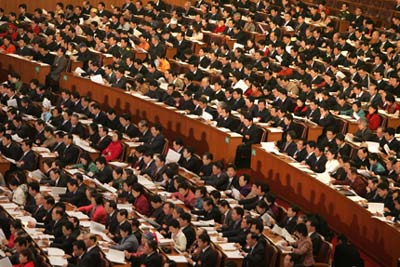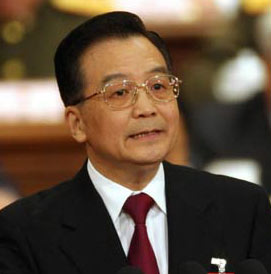|
Premier pledges help for rural poor
(chinadaily.com.cn/Agencies)
Updated: 2006-03-05 10:06
Chinese Premier Wen Jiabao pledged on Sunday that more of China's
economic growth and investment must go to farmers.

Chinese delegates
attend the opening ceremony of the National People's Congress (NPC) at the
Great Hall of the People in China's capital Beijing March 5, 2006.
[Reuters] |
The Chinese government will
spend 339.7 billion yuan (US$42 billion) in agriculture, rural areas and farmers
this year, an increase of 14.18 percent over last year, the Premier
said in his annual government work report at the opening of the national
legislature, the National People's Congress.
"We need to implement a policy of getting industry to support agriculture and
cities to support the countryside, strengthen support for agriculture, rural
areas and farmers, and continue making reforms in rural systems and innovations
in rural institutions to bring about a rapid and significant change in the
overall appearance of the countryside," Wen said.
A large section of his
report addressed the government's plans to build a "new socialist countryside"
for the country's 750 million farmers. The programme is a "major historic task"
to divert government investment, education and health care, and bank loans to
the countryside.
To build the "new countryside," the Central Committee of the Communist Party
of China has set objectives including "enhanced productive forces, higher living
standards, civilized living style, an orderly and clean environment, and
democratic administration."
"We must apply the guiding policies of industry replenishing agriculture and
the cities supporting the countryside," he said.
Wen said these policies would bring industry and cities not pain but more
growth by stimulating domestic demand. He described the measures as part of the
government's "strategy of expanding domestic consumption."

Chinese Premier Wen Jiabao delivers a speech
during the opening of the National People's Congress at the Great Hall of
the People in Beijing March 5, 2006. The Premier promised a economic
growth rate of 8% for 2006, and a massive US$420b spending to improve the
rural sector. [Xinhua] |
Income rises would provide cash for the poor to spend on consumer goods, and
improved social security and more affordable hospitals and schools would ease
fears about the future, he said.
Some 2,927 delegates of the National People's Congress gathered at Beijing's
Great Hall of the People for the opening of the annual session.
Pledge to eliminate rural compulsory education
charges
In what was called "a milestone event" in China's
educational history, Wen also pledged that the government would
eliminate all charges on rural students receiving a nine-year compulsory
education before the end of 2007.
The new policy will benefit some 160
million school-age children in the vast rural region, who account for nearly 80
percent of the country's primary and junior middle school students.
"Over the next two years, we will completely eliminate tuition and
miscellaneous fees for all rural students receiving compulsory education," said
Wen.
The policy's successful implementation, which requires an increase of 218.2
billion yuan (US$27.27 billion) in the central government expenditure over the
next five years, will basically lift China out of the rank of less than 30
countries worldwide which fail to provide their kids with completely free
compulsory education, according to the premier.
In 1986, China
promulgated the law on compulsory education, which stipulates that the state
should provide a nine-year compulsory education "free of tuition fees" for all
primary and junior middle school students.
However, the law has failed
to guarantee the funding of compulsory education, thus forcing many schools,
particularly those in the impoverished rural regions, to either continue to
collect the tuition fees or charge various "miscellaneous fees" on their
students in the name of "voluntary donations," "fund-raising for school
construction" or "after-school tutoring fees."
Recent surveys conducted
by sociologists in several rural areas show that currently the Chinese farmers,
whose annual per capita net income stood at a mere 3,200 yuan (US$400) in 2005,
have to pay about 800 yuan (US$100) a year for a child's education in the
elementary and junior middle school stage.
Excessive charges by the
schools have become a major reason behind the increasing rural dropouts in
recent years. The dropout ratio for rural primary and junior middle schools in
2004 was 2.45 percent and 3.91 percent respectively, while the figure in the
less developed central and western regions was much
higher.
Program to "clean-up" rural areas
China has launched a pilot campaign to tackle major environmental problems in
its vast rural areas, according to the State Environmental Protection
Administration of China.
The program is a major move of the Chinese
government over the next five years to overhaul the rural environment in a bid
to enable farmers to bid farewell to the garbage-ridden and dust-smothered
environment.
At present, the program has already been carried out in six
provinces, autonomous regions, municipalities and counties, including Jiangsu,
Jilin and Ningxia. And the program is to extend gradually to other parts of the
country, the administration said.
Ningxia Hui Autonomous Region in
northwestern China was the first region that had experimented with the program.
According to the Administration, Ningxia's double-digit economic growth in the
past five years has laid a solid foundation for its
implementation.
|